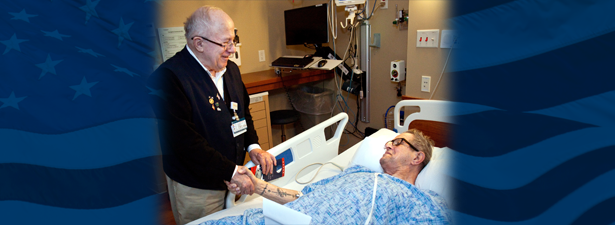Edward-Elmhurst Health

Health System Offers Special Recognition to Patients Who’ve Served
“There are not enough ways for us to say thank you.” That’s how the card begins to military veterans who receive care through Edward-Elmhurst Health. The suburban Chicago health system has made a concerted effort to recognize and honor these American heroes through its Veterans Recognition Program begun in 2016.
At registration, patients are asked if they served in the military and would like to participate in the program. Those who do receive an American flag pin and the thank-you card at their bedside. This kind of appreciation—coming years after many veterans wore the uniform—helps connect with patients and shows them how much they’re valued.
The thank-you card alone is a moving reminder of the sacrifices veterans have made. In acknowledging their service, the card says, “You have dedicated your life to protecting others so we can live free.”
Veterans also have a special door hanger that reads, “This room is occupied by one of our nation’s heroes.” Meals are delivered to them on trays with specially designed place mats and table tents.
More than 2,200 veterans have been recognized as of early 2019. The program also fosters connections with volunteers, many who are veterans themselves. Elmhurst Hospital volunteer Guilio Camerini—a Navy operating room technician in the 1960s—has seen firsthand the response to the program.
“I had one patient say, ‘This is the first recognition I’ve gotten for being a veteran,’” he said. “It makes everybody feel good.”
As part of its commitment to veterans, Edward-Elmhurst Health recognizes staff and volunteers who are on active duty or retired veterans at an annual Veterans Recognition Breakfast. We Honor Veterans, a program of the National Hospice and Palliative Care Organization, has praised Edward-Elmhurst Health for its efforts.
Mary Lou Mastro, System CEO of Edward-Elmhurst Health, said it’s important to honor patients and employees who are veterans—and to understand their specific healthcare issues.
“We also wanted to educate our staff about service-related illnesses and conditions that military veterans experience so they could be better prepared to take care of patients who’ve served in the military and their families,” Mastro said.

